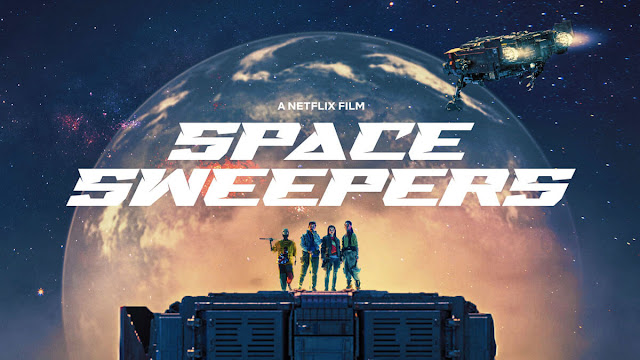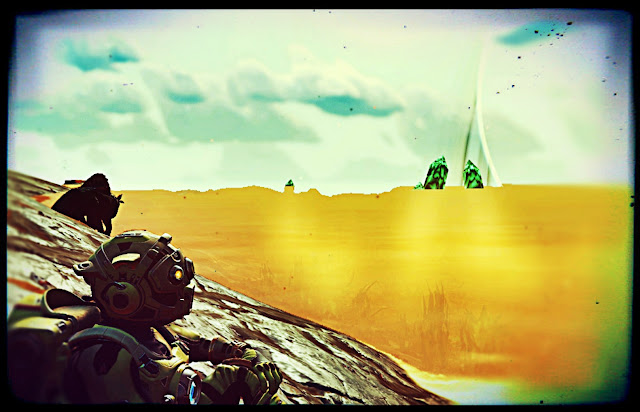Space Sweepers: A Cautionary Tale about Pursuing the Big Idea Blackhole
Netflix's sci-fi action drama started off sounding all the right notes. A ragtag crew of misfits, one step ahead of bankruptcy, zoom out of the black of space in their rustbucket of a spaceship to snatch a bit of orbital debris from competing "space sweepers," that is, people who earn a meager living salvaging space junk from Earth orbit. This early action sequence was impressively rendered with CGI that could rival any Hollywood studio and was expertly paced to keep you on the edge of your seat. The movie had just gotten going but I was already impressed! Gorgeous CGI, thrilling action, wry humor, and an industrial dystopian sci-fi setting that I so love - it was looking like Space Sweepers was going to be a winner!
Sadly, it wasn't.
As soon as this entertaining opening ends, Space Sweepers makes the too common mistake of chasing what I like to call the "Big Idea Blackhole." The BIB (for short) is when a science fiction movie needlessly injects a contrived storyline that brings little to the plot except for narrative bloat that serves to weigh down the movie instead of elevating it. As with the event horizon of a black hole, when a movie dives into the BIB, it is usually lost to the abyss forevermore.
Why do movies do this? Is it due to a bad case of Star Wars-itis that still infects the entertainment industry decades after the launch of this franchise? Or is it just due to the vainglorious need of screenwriters and directors to tell a larger-than-life story? Whatever the reason, I've seen more sci-fi movies ruined by this misguided impulse than I dare to count. Space Sweepers is just the latest victim of the BIB. There will be more.
Space Sweepers begins with an introduction best described as an unabashed, um, tribute to the iconic Blade Runner opening sequence where we get to see a dystopian setting, this time of earth ruined by years of pollution, reducing the mass of inhabitants - but not the rich or powerful, of course - into poverty and desperation. But don't worry because - and stop me if you heard this one before - a genius billionaire, by the name of James Sullivan, has the solution to the planet's problems. After building an enclave in orbit for the finest people (by the way, have you seen Elysium? I don't know why I just thought of that movie...) Sullivan is determined to terraform Mars into the new earth. But to do this he needs to capture a little girl who carries within her the ability to control nanobots. Why is this important? That is not entirely clear. The movie does mention something about rogue nanobots living at a Lagrangian point but never explains how they got there, why they are rogue, how they are involved with terraforming Mars, or even why they seem to materialize out of thin air anytime the plot needs them to. But the girl, whose name is Kim Su-ni, can control them, so she now becomes the MacGuffin of the movie with everyone, from environmental freedom fighters to the girl's father, all trying to track her down for different motives. Sullivan's motives for obtaining the child are particularly weird in that he wants the child not to study her but to - get this - strap her inside the core of the "Factory," an orbital factory...or is it a populated city? Both? Well, something called the "Factory" anyway, and detonate a bomb, killing the girl and sending the Factory crashing into earth, destroying the planet. Why? I have no idea. I mean, if I had a girl with power over these ubiquitous and deadly nanobots (but not deadly when the plot requires it), I would want to keep her around. Wouldn't you? Be that as it may, that is what Sullivan wants. He also wants Su-ni's father, who created the medical treatment that inadvertently gave Su-ni this remarkable ability, dead as well. (Again, call me crazy, but I think it would be smarter to keep such a genius alive and on the payroll and not kill him.) Oh! And I almost forgot! If all of that wasn't enough, we also learn that Sullivan transforms into a murderous monster when he gets mad. So...yeah.
<Sigh>
Are you still with me? You are? Really? Okay. Continuing...
Into this mess of a narrative, we have the ragtag crew of Victory, a space sweeper ship crewed by the (suspiciously young) Captain Jang, the tattooed engineer Tiger Park, the gruff pilot Kim Tae-ho, and the wisecracking robot, Bubs. For most of the movie, this odd lot of characters is portrayed as your typical ship full of losers and misfits who come together as an ad-hoc family out of desperation. But then that darn narrative BIB flashes its event horizon and we suddenly learn that our protagonists are not ordinary space tramps, but superheroes in disguise. For example, Tiger Park was one of the earth's most powerful drug kingpins who gave up all his drug money to help children (how he is helping children by playing the part of a broke space salvager is beyond me). Jang is revealed to be a genius engineer who used to work for Sullivan but gave it up to become a space pirate who once attempted to kill the evil billionaire. Pilot Tae-ho turns out to be the former commanding officer of the super-soldiers employed by Sullivan to enforce his reign of terror (which only some people seem to be aware of) but had quit after he massacred one too many ships full of refugees trying to sneak into Elysium...er, whatever this movie's version was called. Even Bubs the joking and gambling robot is revealed to be a former combat bot! Boy, isn't it fortuitous that the miracle child happens to fall into their hands, leaving them to save the day from the evil tyrant who likes to eat his meals with dirty hands (I am not making that up)! Oh, and there is also another subplot about Tae-ho's daughter who was sucked out into space but can yet be rescued if he can raise enough money to pay for the rescue attempt (this eventually involves nanobots too, but I refuse to even attempt an explanation about that bizarre twist at the end of the movie).
Are you seeing the problem with Space Sweepers? All of this is completely needless, not to mention confusing as heck, and so preposterous that it undermines any possible suspension of disbelief. The plot of Space Sweepers is its own worst enemy. The tragedy of Space Sweepers is that the movie had the right idea at the beginning. A crew of misfits, some of whom are running from criminal backgrounds, band together to try to make a new life in a very dangerous, very competitive job of salvaging space junk. That's your winning plot right there! There was absolutely no need to inject anything more grandiose than that, especially when you had a cast of characters that were more than capable of making such a basic plot shine with their unique personality quirks. But instead, Space Sweepers had to go off chasing the BIB with a plot that was unsatisfying as it was confusing, largely due to the superfluous space junk that was crammed into it.
It is after watching movies like this that I am reminded of my idea for an outreach program for aspiring directors of science fiction films. As soon as a director expresses an interest in doing such a movie, particularly a space movie, I would like to invite the director over and strap him into a chair where he would be forced to play a few hours of such PC games like Elite: Dangerous or Eve Online to help sober them up and show the needlessness of chasing BIBs. You see, both games deal with players who try to make a living out "in the black" of space. How they do it is up to them but one thing has always proved true: against the vast immensity of space, any profession is inherently fascinating. This is why, for example, both games have a healthy community of "space truckers" who enjoy the game simply by moving goods and cargo from station to station, planet to planet.
 |
| A space trucker preparing to land at an orbital station in Elite: Dangerous |
When you are piloting a ship through the soul-sucking void of darkness and hard radiation that is outer space, even engaging in the dullest occupation can be a thrilling tale of survival in an oft surreal environment. This is why such games as Elite and Eve lack any sort of the grandiose nonsense found in Space Sweepers. It doesn't need it. Space itself (with the help of the occasional pirate) provides more than enough thrills and chills for most players.
After making them play those two games, I would then require that they watch the classic film noir, Thieves Highway. This film is about a returning GI who has to take over his father's trucking business when his dad is crippled in a suspicious accident. Not knowing anything about being a truck driver, this man needs to learn the ropes on the job, from the essential maintenance necessary to keep a truck running, to how to work the best deal for his cargo of fresh produce.
 |
| Thieves Highway (1949) |
Of course, being a film noir, there is a villain, but not some maniacal bad guy trying to take over the world, but a petty crook who is trying to be the biggest fish in a very small pond. Good enough!
I suspect Space Sweepers would have benefited from the above instructive content. As I wrote at the start of this review, the movie already had a solid premise, one that would have been right at home in either the space gaming world or in the film noir genre. Being a space sweeper already had enough potential for thrills and excitement that it didn't need any space opera embellishments. If the movie had stuck with the opening premise of a bedraggled crew of salvagers trying to make a buck and stay alive long enough to spend it, that would have given us a much better premise for a movie than what we got. You could have even added in a petty criminal trying to push them out of the business, as Lee J. Cobb tried to do to Richard Conte in Thieves Highway. There. There is your movie.
Science fiction directors, from Space Sweepers' Jo Sung-hee to Interstellar's Christopher Nolan need to reign in their scripts. Enough with these massively intricate, confusing, and ultimately pointless attempts at grandiosity for the sake of grandiosity. Sure, there is a time and place for such movies, but not every sci-fi flick needs to operate on high octane. Sometimes a simple story about people being people against the spectacular backdrop of outer space is more than enough to propel a movie. When I think about some of my favorite short stories from the so-called golden era of science fiction, it is usually such simple tales that were my favorites (The Cold Equations by Tom Godwin comes to mind). And consider this: did the sci-fi classic Alien have a wildly convoluted plot like Space Sweepers or was it much simpler fare? There is a reason why the crew of Nostromo is often referred to as "space truckers."
It is long past time for sci-fi to return to simpler fare, especially as the world enters what appears to be a second Space Race. I guarantee you the practicalities of living and working in space will prove far more relevant to audiences than tales about children who can control nanobots.
Word to the wise: don't chase the BIB. Your movie will thank you.



Comments
Post a Comment